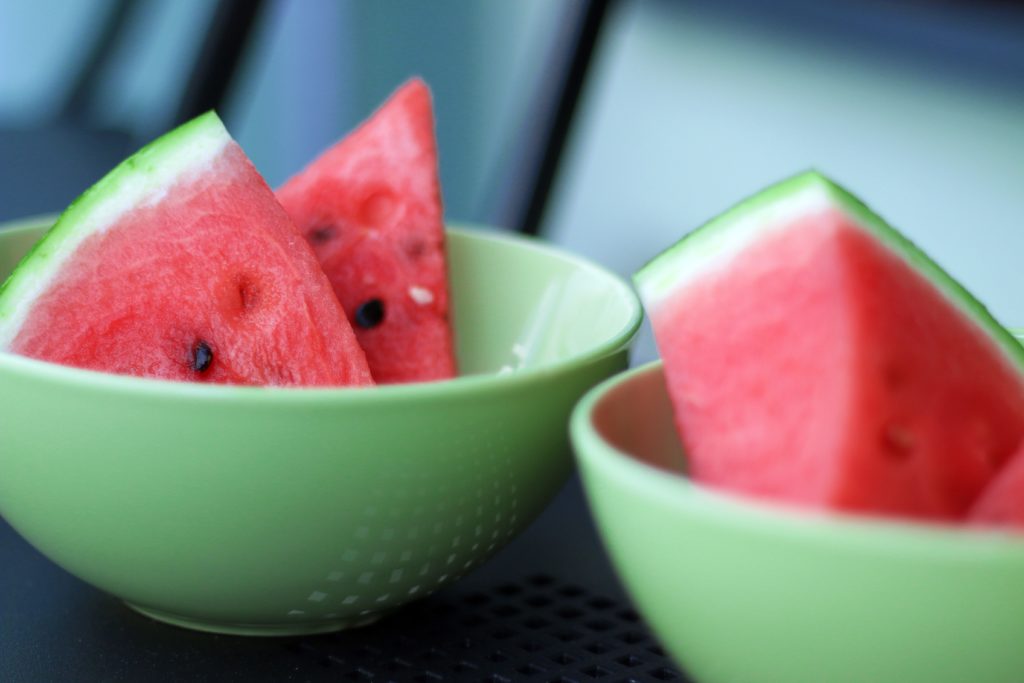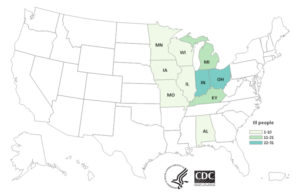All fields are required
Posted in Our Blog,Outbreaks & Recalls,Salmonella on April 24, 2019

CDC, FDA and public health and regulatory officials in several states are investigating a multistate Salmonella outbreak that has led to now 117 illnesses in 10 states and 32 hospitalizations. Officials have linked this outbreak to pre-cut melons sold by Caito Foods LLC in Indianapolis, Indiana. Here’s what the latest stats in the Salmonella Melon Outbreak look like:

Since April 12, the company has been voluntarily recalling precut and fresh cut watermelon, honeydew melon, cantaloupe and mixed fruit medleys (which have the potentially contaminated melons in them). These products could potentially be contaminated with Salmonella Carrau, an organism that leads to food poisoning in people of all ages and causes severe infection in high-risk individuals like young children, pregnant women, the elderly, and those with compromised immune system.
The outbreak and the root cause for it is still under investigation. Meanwhile, Caito Foods is recalling these products and has put a stop to food production at their facility for the time being.
About the Products:
The affected products were packed in clear, plastic clamshell containers and distributed in Illinois, Indiana, Iowa, Kansas, Kentucky, Michigan, Minnesota, Missouri, Nebraska, New York, North Carolina, Ohio, Pennsylvania, Tennessee, West Virginia and Wisconsin. You can find the full list of recalled products, including the brand, product label and retailer where sold, on the FDA’s website. As Caito Foods and their related company, SpartanNash, supply to independent retailers nationwide, it is important that you look at the description on the label and read the brand information to identify the product. According to the FDA:
Recommendations:
It is possible that these products are still on the shelf in your neighborhood store and likely still in your fridge at home. So, the recall is directed to both retailers and consumers. Consumers should not consume the product and get rid of any remaining product – even if they have already eaten some of the product and have not become sick. Retailers and wholesalers should check their shelves and inventories to make sure none of the recalled products are present in their warehouse or available for purchase by the consumers. Obviously, if they find they have the products, they should throw them out.
The link between these products and the Salmonella illnesses was discovered when state health departments gathered the information from the ill individuals. They then alerted the CDC to this concerning (and likely growing) list of illnesses.
Here is a breakdown of number of reported cases from different states:
| State | Ill People |
| Alabama | 1 |
| Iowa | 1 |
| Illinois | 7 |
| Indiana | 23 |
| Kentucky | 21 |
| Michigan | 22 |
| Minnesota | 3 |
| Missouri | 7 |
| Ohio | 31 |
| Wisconsin | 1 |
| Total | 117 |
Investigation Details:
The investigation began on April 2, 2019, when PulseNet system identified illnesses that were a part of the outbreak. After illnesses were reported by public health and food regulatory agency laboratories, DNA fingerprinting was done on Salmonella bacteria isolated from ill people by using techniques called pulsed-field gel electrophoresis (PFGE) and whole genome sequencing (WGS). PulseNet, managed by CDC, keeps a log on a national database of these DNA fingerprints to detect any potential outbreak. Whole Genome Sequencing (WGS) results showed that isolates collected from ill people were closely related genetically. This means that the individuals who fell ill became infected by a common source of contamination.
As of April 12, 2019, 93 people have confirmed illnesses with the same strain of Salmonella Carrau in a total of 9 states. Ill people range from less than 1 to 98 years, median age being 53. 57% of those infected are female. 23 have been hospitalized. No deaths have been reported yet.
More illnesses may be reported due to the timeframe it takes to link when a person falls ill and when the illness is reported to the outbreak. This can take around 4 weeks.
Epidemiologic and traceback evidence suggests that pre-cut melon supplied by Caito Foods LLC of Indianapolis, Indiana is behind the outbreak. During interviews, ill people answered questions about the food they ate and other exposures in the week before they became infected. 77% of the ill people said that they ate pre-cut melons from grocery stores, including pre-cut cantaloupe, honeydew, watermelon or fruit-salad mix. 4 other people said that they had eaten pre-cut melon outside of their home.
Traceback information collected sourced the melons to Caito Foods LLC products being sold in the stores. On April 12, 2019, the company recalled cantaloupe, pre-cut watermelon, honeydew melon and pre-cut fruit medley products containing one of these melons processed at their Indianapolis, Indiana facility. The investigation is still ongoing.
Today, the CDC updated the outbreak numbers to account for the additional cases.
Advice for Consumers:
About Salmonella:
Salmonella is a bacterium that causes food poisoning. It’s one of the most common causes of foodborne illness in the US. It causes 1.2 million illnesses, 23000 hospitalizations and 450 deaths in the US each year. The bacteria commonly live in the intestines of many animals and humans. They shed it in their feces. Salmonella infection happens through contaminated food or water.
Salmonella food poisoning is most commonly caused by raw meat, poultry, eggs and unpasteurized dairy products. It can spread to fresh fruits and vegetables during irrigation due to contaminated water, fertilization by contaminated manure, or during the processing stage (packaging, cutting, etc.) when it comes into contact with the bacteria through human hands or contaminated products.
Salmonella causes symptoms like diarrhea (sometimes bloody), nausea, vomiting, and abdominal cramps. The symptoms last for around 4 to 7 days in healthy people. Young children, elders and those with compromised immune system might require treatment and hospitalization. Some people might develop reactive arthritis or chronic arthritis. This is difficult to treat and might even last lifetime. Individuals who develop this condition can experience painful joints, painful urination and irritation in the eyes.
Preventing Salmonella infections requires following proper food safety practices and maintaining good hygiene. Wash your hands, cook meat and poultry to their optimum cooking temperatures, keep raw meat and fresh fruits and vegetables separate, and look out for any recalls or outbreaks to keep safe from contaminated products.
The Lange Law Firm
Our mission is to help families who have been harmed by contaminated food or water. When corporations cause Salmonella food poisoning outbreaks or Legionnaires’ disease outbreaks, we use the law to hold them accountable. The Lange Law Firm, PLLC is the only law firm in the nation solely focused on representing families in food poisoning lawsuits and Legionnaires disease lawsuits.
If you were infected with Salmonella after eating fresh cut melon or melon mixes and are interested in making a legal claim for compensation, we have a Salmonella lawyer ready to help you. Call us for a free no obligation legal consultation at (833) 330-3663 or send us an e-mail here.
By: Pooja Sharma, Contributing Writer (Non-Lawyer)